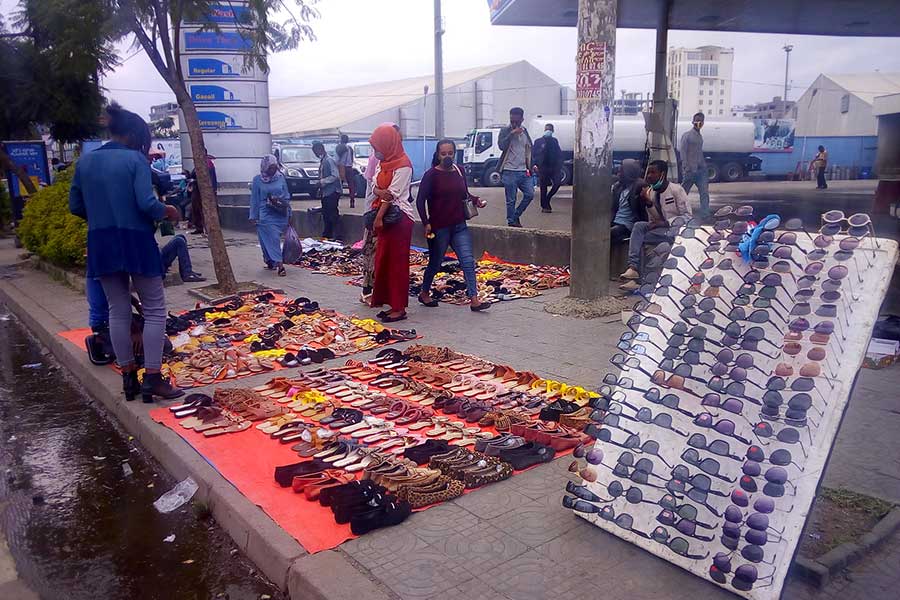
Editorial | May 29,2021
To anyone who had visited Shola Gebeya two months ago, it may have looked like one of Addis Abeba’s popular open markets was under self-imposed lockdown. Idle traders hungry for customers, sleepy shopkeepers having a really long day, and retailers with empty shelves were the manifestation of the gloomy market.
With the Easter holiday being just around the corner, traders at Shola Gebeya have been gearing up for resurrection over the last two weeks, hoping that consumers will loosen their tightened purse strings. It seems that their hope was in vain as the market remains sluggish.
“Little has changed since the last holiday. Our daily sales income is still very low, while consumers are shying away from the market,” says Temesgen Getahun, a retailer who owns a shoe store.
As followers of the Christian faith mark the second Easter holiday since the Novel Coronavirus (COVID-19), which has killed over 3,600 people so far, came into the picture, businesses are still feeling the pinch of economic slowdown, partly stemming from supply-driven macroeconomic woes, the political unrest across regions, and the fighting in Tigray Regional State.
Though the market seems to have picked up lately, with international organisations including the IMF predicting that Ethiopia’s economy would grow by at least two percent this year, nothing seems to have changed for the traders, including Temesgen. Looking after the shop on behalf of his mother, the unenthusiastic look on his face is telling that business has not been so good for him.
“Business has been as slow as the past holiday seasons, if not worse,” says the trader, frustrated with what has been unfolding in the country lately. “Selling non-basic goods means fewer holiday sales as consumers focus on essential items, especially food supplies,” Temesgen observes.
The price of butter has increased shockingly, almost doubling from the going rates during the Christmas market.
For the traders, welcoming just a few shoppers clearly indicates that more time is needed for recovery from the business slowdown.
Even those willing to spend more and buy some non-basic items are shunning retail stores as inflation stresses households with its harsh grip; a situation, for the economist Atlaw Alemu, which leads to a change in consumers’ behaviour.
“At such times, people tend to cut down on relatively non-essential goods and stick to the basic ones,” explains Atlaw.
Of all holiday commodities, traditional butter witnessed the highest price increase, reaching as high as 600 Birr a kilo, twice the figure registered during the last holiday, according to Dereje Yadeta, who has been trading butter for almost five years. “Prices started to increase starting from halfway through the lent,” he told Fortune.
Exploring the unexpected upsurge, this is driven by a shortage in the supply of butter, which is determined by the production and utilisation of raw milk. With dairy farmers making butter using leftover milk, more consumption of milk means less supply as it leads to a fall in production, according to traders. A source of worry for traders as they run out of stock, this is more burdensome for consumers.
“I paid 1,160 Birr for two kilos of butter,” says Menen Tesfaye, a retired woman living with her daughter, who is the only one generating income in their household. “I don’t know what will come ahead.”
Experts say that this is evidence showing consumers’ confidence, an economic indicator that measures a degree of optimism over the economy, is declining; a state of affairs that is quite common when there is inflationary pressure. For Solomon Bekele, head of the marketing directorate at the Addis Abeba Trade Bureau, the problem is more about supply shortage.
Citing the case of butter, he explained that political instability is one of the factors leading to a shortage of supply. “Consumers associations are trying to stabilise the market by selling butter for 360 Birr a kilo, an action which is instrumental to reduce the inflationary pressure during the holiday season,” says Solomon.
Though the most unusual disruption in the market is caused by the cost of butter, most commodities have seen a moderate increase in price while a few have decreased. The price of chickens, for instance, has relatively stabilised, showing no surge since the Christmas holiday. In the Shola and Merkato markets, a chicken is being sold for between 400 and 580 Br. Similarly, the price of eggs also remained relatively stable at 6.50 Br a unit.
Even steadier is the edible oil market. Unlike the trend observed for the last three months, no price upsurge has been observed, largely because of a growth in the supply of the item. A litre of edible oil produced by Phibela Industries, which went operational two months ago with an investment capital of 4.5 billion Birr, is now available for 47.40 Br, twice the price of imported oil.
“Phibela oil is being distributed all over the city through the outlets of the associations. To supplement the local supply, oil is being imported as well, so customers needn't worry," Solomon assures.
In addition to moderating supply issues, the City Trade Bureau has put together a task force, as it usually does, to make sure all goes well in the market. Their tasks range from making sure that the COVID-19 protocol is being followed to stabilising the market. But the latest report from the Central Statistical Agency (CSA) suggests that they have had little success in achieving the latter.
Headline inflation reached 20pc last month. Food inflation, in particular, surged by 22.2pc, while non-food items soared by 17.1pc. Among all parts of the country, the Southern Nations Nationalities & Peoples Regional State saw the highest inflationary pressure, reaching 30.5 percent, higher than the national average, while it reached 19.5pc in Addis Abeba, where it is likely to increase with the growth in the prices of food and non-food items seen in the holiday market.
A case in point is the cattle market at Shola where the price of oxen showed a significant jump, as much as 7,000 Br, from the last holiday. This is alarmingly high compared to the change witnessed in the price of sheep, which has increased by between 500 Br and 1,000 Br, ranging between 2,000 Br and 8,000 Br.
Tesfaye Abate, who sells oxen at the Shola cattle market, blames the surge in price on the shocking increase in the cost of fodder. A type of fodder that would normally go for 650 Br is now being sold for 1,000 Br, and others that used to be sold for 700 Br have almost doubled in priced within a matter of weeks, pushing sellers to make adjustments.
“I now sell oxen brought from Wellega, Harer, and Gonder for prices ranging from 32,000-37,000 Birr,” says Tesfaye. This is a significant jump from the least amount of money needed to buy an ox during last year the same period, which was around 15,000 Br.
Another factor that has impacted the cattle market is the daily withdrawal limit enforced by the National Bank of Ethiopia, which is contributing to the skyrocketing prices.
“Since we cannot hold more than 200,000 Birr, we cannot bring all the cattle that we need once. There is back and forth, which is driving prices up,” Tesfaye laments.
Though it is difficult to say what the future holds, the present circumstances indicate that tough times may be ahead, and market-goers like Menen are stepping cautiously, hoping for the best from the post-election period.
PUBLISHED ON
Apr 30,2021 [ VOL
22 , NO
1096]

Editorial | May 29,2021

Fortune News | Feb 04,2023

Fortune News | Sep 10,2021

Radar | May 20,2023

Radar | Sep 22,2024

Radar | Nov 21,2020

Fortune News | Sep 09,2023

Viewpoints | Dec 31,2022

Radar | Oct 14,2023

Fortune News | Jul 06,2025

Dec 22 , 2024 . By TIZITA SHEWAFERAW
Charged with transforming colossal state-owned enterprises into modern and competitiv...

Aug 18 , 2024 . By AKSAH ITALO
Although predictable Yonas Zerihun's job in the ride-hailing service is not immune to...

Jul 28 , 2024 . By TIZITA SHEWAFERAW
Unhabitual, perhaps too many, Samuel Gebreyohannes, 38, used to occasionally enjoy a couple of beers at breakfast. However, he recently swit...

Jul 13 , 2024 . By AKSAH ITALO
Investors who rely on tractors, trucks, and field vehicles for commuting, transporting commodities, and f...

Jul 5 , 2025
Six years ago, Ethiopia was the darling of international liberal commentators. A year...

Jun 28 , 2025
Meseret Damtie, the assertive auditor general, has never been shy about naming names...

Jun 21 , 2025
A well-worn adage says, “Budget is not destiny, but it is direction.” Examining t...

Jun 14 , 2025
Yet again, the Horn of Africa is bracing for trouble. A region already frayed by wars...